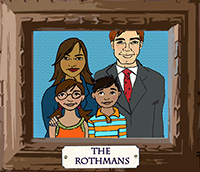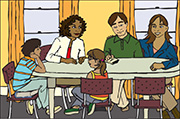With whom can Ms. Milton communicate, consult, and collaborate to meet the needs of students with visual impairments?
Page 7: Families

Families play an essential role in the education of students with visual impairments. Also, students can provide important information related to their educational needs. The types of information families and students can provide include:
- Type and severity of vision loss
- Learning needs and strengths
- Level of independence
- Needed accommodations and adaptive equipment
- General likes and dislikes, including activities and academic subjects
| Sample Questions to Ask Families | |
| Can you tell me about your child’s vision loss? | |
| How independent is your child at home? At school? In the community? How does your child demonstrate his or her independence? | |
| What particular difficulties do I need to be aware of? How much assistance do you feel I need to provide for these areas of need at this time? | |
| What reports or other information about your child do you feel are important for me to have? | |
| Is your child seeing other specialists or professionals that I should be aware of? | |
| Is your child using any special equipment at home? Does he or she know how to maintain it? What is done when it isn’t working? | |
| Can you recommend any strategies that would help me to work effectively with your child? | |
| There will likely be some questions about your child’s vision loss from other students. Do you have suggestions about what might be said and how it should be presented to the class? | |
| What educational goals do you have for your child? | |
| What social goals do you have for your child? | |
| Who are your child’s friends? Do any of these friends know how to assist the child when needed? | |
| Are there any questions that you would like to ask me? | |
Adapted from British Columbia’s Ministry of Education, Special Education Branch. Retrieved from www.bced.gov.bc.ca/specialed/visimpair (2007).
Parents, guardians, and students may offer suggestions or assistance, like the examples below, that aid the instruction, assessment, and technical assistance and support of the student.
Instruction

Parents/ Guardians or Students:
- Share previously implemented academic, behavioral, and social skills strategies
- Reinforce instruction and skills learned at school through additional practice or homework
- Create new learning opportunities for students that are not offered through the school (e.g., going to a theatre)
- Communicate learning preferences and mediums
- Inform teachers when instructional content needs to be repeated or described in greater detail
Assessment

Parents/ Guardians or Students:
- Complete surveys or questionnaires about skills and level of functioning
- Provide information during IEP meetings for the purpose of educational planning
- Communicate modifications needed for classroom assessment
Technical Assistance or Support

Parents/ Guardians or Students:
- Identify assistive and adaptive technology and train school personnel on how to use it
- Collaborate with school personnel and other professionals about the student
- Share information with school personnel and classroom peers about visual disabilities
- Communicate the need for accommodations, preferred assistive technology, and assistance
- Share strategies for getting their attention with classroom peers and teachers
 At the beginning of the school year, Ms. Milton meets with Emily, Evan, and their parents, Mr. and Mrs. Rothman. Mrs. Rothman shares with Ms. Milton that Evan struggles with math and has difficulty completing his homework because of the abacus and the other devices he has to use. She explains that one successful strategy has been to allow Evan a 5-minute break after working for 20 minutes on homework.
At the beginning of the school year, Ms. Milton meets with Emily, Evan, and their parents, Mr. and Mrs. Rothman. Mrs. Rothman shares with Ms. Milton that Evan struggles with math and has difficulty completing his homework because of the abacus and the other devices he has to use. She explains that one successful strategy has been to allow Evan a 5-minute break after working for 20 minutes on homework.
Also during the meeting, Emily asks Ms. Milton if she can assign her the cubby at the end of the counter. This would make it easier for Emily to find her belongings because she can use the corner of the counter as a landmark.